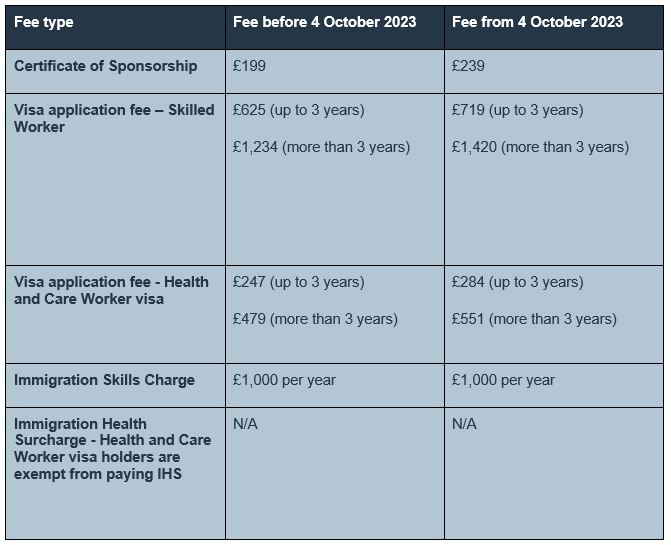Benefits of International Recruitment in the UK’s Social Care Sector
November 14, 2023
By: Ian Bell, Priyel Upadhyaya, Selina Alhammami
Skills for Care recently released a report in which it analysed the state of the adult social care sector and workforce in England.
This blog reviews its findings and examines how international recruitment continues to have a positive impact on this sector in the UK. It then covers the eligibility requirements for the Health and Care Worker visa and how Fragomen can assist interested parties with navigating this area of immigration.
What is Skills for Care?
Skills for Care is the strategic workforce development and planning body for adult social care in England. The organisation works closely with employers, the government and other partners to ensure the social care sector has the right people, skills and support it requires to deliver the highest quality care and support.
The report provides a thorough analysis of the adult social care workforce in England. This includes recent trends in workforce supply and demand, international recruitment and retention, demographics and future workforce projections.
International recruitment
Skills for Care reports that the adult care sector is more diverse in nationality than the population of England.
The below figures have been reported by Skills for Care in the adult social care sector:
- Diversity: 19% of workers are non-British (although they make up 9.7% of the overall population in England).
- Filled posts: 70,000 people (compared to the 20,000 in 2021-2022) started direct care-providing roles between March 2022 and March 2023.
- Turnover: the rate for internationally recruited workers is 16.5% compared to 30.7% of workers recruited domestically between December 2022 and July 2023.
- Vacancy: employers recruiting internationally saw a higher decrease in their vacancy rate (by 13.5%) compared to those not employing international recruits (9.1%) between January 2022 and July 2023.
The recent changes to the Immigration Rules have impacted international recruitment in the Health and Social Care sector. Firstly, the UK Government introduced the Health and Care Worker visa and secondly, care workers were added to the Shortage Occupation List (SOL) in February 2022 (senior care workers were added in April 2021).
The impact of the above changes to the Immigration Rules has been the key driver behind the increase in international recruitment. As seen from the above figures reported by Skills for Care, the impact has been quite significant. The report highlights the positive impact the surge in international recruitment has had on the adult social care sector, and the above figures confirm this impact, which includes an increase in diversity rate, an increase in filled posts, and a decline in vacancy and turnover rates.
According to the report, the surge in international recruitment is vital given that the adult social care sector is estimated to contribute £55.7 billion gross value added (GVA) per annum (increased by 8.5% from 2021/22) to the economy in England. The contribution of international recruitment is even higher than the ‘Accommodation and food service activities’ industry, which contributed £41.8 billion in 2021.
Fragomen can assist businesses to recruit internationally (i.e., through the Skilled Worker visa and Health and Care Worker visa routes), which will allow them to contribute to the positive impact this has on both the adult social care sector and the UK economy.
Skilled Worker eligibility requirements and the Health and Care visa
The Health and Care Worker is a category within the Skilled Worker visa when medical professionals are applying to come to the UK to do an eligible job with the NHS, NHS supplier or in adult social cases. Their employer must be a company that is listed as an A-rated sponsor on the Home Office’s register of sponsors. The sponsor licence allows sponsors to issue a Defined Certificate of Sponsorship (DCoS) to overseas new hires to facilitate the visa application.
The requirements for this visa category are largely the same as the Skilled Worker visa.
- Sponsorship: The individual must have an employer sponsor who holds a Skilled Worker sponsor licence.
- Appropriate Skill Level: The job must be at or above the minimum skill level which is RQF Level 3 (A-Level or equivalent), assessed with reference to the Standard Occupation Classification (SOC) codes. The SOC Codes eligible for this visa type are all at the minimum skill level.
- English Language: The individual must demonstrate an ability to speak English at B1 level (AS-Level or equivalent).
- Minimum salary requirement: The minimum salary requirement for a Health and Care Worker visa is £20,960 or the going rate for the SOC Code (if that is higher).
Visa fees increase and its impact on employers
UK visa fees have increased as of 4 October 2023, with most rises between 15-20%. This table outlines the fees applicable to the Health and Care Worker visa route.

Although the fees have increased, individuals applying under the Health and Care Worker route benefit from reduced visa application fees in comparison to their Skilled Worker counterparts and are also exempt from the Immigration Health Surcharge, which is currently £624 per year. This is also due to increase to £1,035 per year, expected to come into force on 16 January 2024.
With international recruitment being a driver behind the reduction in vacancies in this sector, the increased fees are unlikely to deter employers from hiring internationally. The benefits outweigh the cost implication of the visa application with high retention rates being a clear positive.
Shortage Occupation List review
The Migration Advisory Committee (MAC) also released its review of the Shortage Occupation List (SOL) earlier this month, with a few key takeaways to note:
- First, while the headline is removing the number of roles from the SOL from 38 to eight UK-wide (and two for Scotland), the MAC recommended that care workers and senior care workers remain in the UK-wide SOL and did not request further evidence in support of this. This means that roles under the care worker or senior care worker will be able to continue to benefit from the lower minimum salary requirement of either GBP 20,960 per year or GBP 10.75 per hour (whichever is the higher amount – salary requirements are subject to change).
- While the MAC proposed removal of the ‘going rate’ discount from the SOL, this will not impact these roles.
- The MAC also recommended that the SOL be abolished in its entirety or should have a radical reform. The alternative suggested in the report would be conducting a standalone review of the role of immigration in particular sectors to identify bespoke and rounded sector-by-sector specific policy answers to shortages, which may benefit the care sector.
- Finally, the MAC recommended that the SOL, if retained, change its name to the Immigration Salary Discount List (ISDL) to reflect its function within the immigration system.
Generally speaking, the MAC does influence the government’s migration policy, so it is worth watching this space.
Need to know more?
Fragomen can help businesses review, plan, establish and operate current and future mobility programmes. The firm’s seasoned professionals provide sector-specific counsel on how to navigate immigration systems all over the world.
For questions or further information, please contact Manager Ian Bell at [email protected] or Associate Priyel Upadhyaya at [email protected].
This blog was published on 14 November 2023, and due to the circumstances, there are frequent changes. To keep up to date with all the latest updates on global immigration, please subscribe to our alerts and follow us on LinkedIn, X, Facebook and Instagram.
















